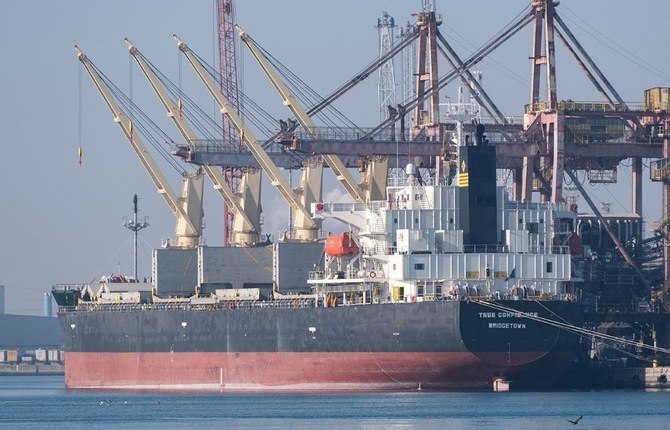AL-MUKALLA: Three sailors were killed in a Houthi missile attack on a bulk carrier near Yemen’s southern port of Aden on Wednesday, the British embassy in Sanaa said.
Two Filipino crew members were among those killed, a statement from the Philippine government said Thursday.
The ship owners on Thursday confirmed the deaths and said two other crew members sustained serious injuries.
The ship is drifting away from land and salvage arrangements are being made, they added.
“With great sadness, the Department of Migrant Workers confirms the deaths of two Filipino seafarers in the most recent attack by Houthi rebels on ships plying the Red Sea and the Gulf of Aden,” the agency said in a statement.
Those killed in the attack on Wednesday appear to be first deaths resulting from Houthi attacks on merchant vessels transiting the key Red Sea trade route.
The Houthi militia attacked Barbados-flagged bulk carrier True Confidence a day after launching a barrage of drones and missiles at US Navy ships in the Red Sea.
#IndianNavy's swift response to Maritime Incident in #GulfofAden.
Barbados Flagged Bulk Carrier MV #TrueConfidence reported on fire after a drone/missile hit on #06Mar, approx 54 nm South West of Aden, resulting in critical injuries to crew, forcing them to abandon ship.… pic.twitter.com/FZQRBeGcKp
— SpokespersonNavy (@indiannavy) March 7, 2024
The United Kingdom Maritime Trade Operations, which tracks down ship attacks, reported on Wednesday that it had received an alert about an attack damaging a commercial ship 54 nautical miles southwest of Aden and urged ships in the area to be cautious and that coalition forces in the area were offering assistance to the targeted ship.
“A merchant vessel in the vicinity is reported to have been hit and has suffered damage. Coalition Forces are supporting,” the UKMTO said.
A US official said the missile caused “significant damage” to True Confidence, adding that its “crew reports at least two fatalities and six injured crewmembers” who abandoned the ship.
The ship is owned by the Liberian-registered company True Confidence Shipping and operated by the Greece-based Third January Maritime, both firms said in a joint statement.
Houthis Kill Innocent Civilians with Missile Attack
At approximately 11:30 a.m. (Sanaa time) Mar. 6, an anti-ship ballistic missile (ASBM) was launched from Iranian-backed Houthi terrorist-controlled areas of Yemen toward M/V True Confidence, a Barbados-flagged, Liberian-owned… pic.twitter.com/W1H0GP4Y6i
— U.S. Central Command (@CENTCOM) March 6, 2024
According to www.marinetraffic.com, which provides data on ship movements and whereabouts, True Confidence was in the area this week, going from China’s Lianyungang port to Jeddah port in Saudi Arabia.
Since November, the Houthis have seized a commercial ship and launched hundreds of drones, missiles and explosive-laden and remotely controlled boats at commercial and navy ships in the Red Sea, Bab Al-Mandab Strait, and the Gulf of Aden, obstructing vital water corridors before Israeli ships.
The Houthis claim that their assaults are intended to push Israel to let food, water and other humanitarian supplies into the Palestinian Gaza Strip.
The Houthi attack on the ship came as the US Central Command said on Wednesday that its forces shot down on Tuesday an anti-ship ballistic missile and three drones fired by the Houthis from areas under their control in Yemen at the Navy ship USS Carney in the Red Sea, adding that its forces also destroyed three anti-ship missiles and three remotely controlled and explosive-laden boats on the ground in Yemen before the Houthis launched them.
In Sanaa, Houthi military spokesman, Yahya Sarea, said on Tuesday night that their naval and missile forces fired a number of naval missiles and drones at two US Navy destroyers in the Red Sea, stating that the attacks were in support of the Palestinian people and retaliation for US and UK strikes on areas under their control in Yemen.
The Houthis also said that the US and UK launched five attacks on Al-Jabanah and Ras Isa in the western province of Hodeida on Tuesday.
On Saturday, local officials and marine activists warned of an impending ecological calamity in the Red Sea after the MV Rubymar, a Belize-flagged and Lebanese-operated ship, sunk with a load of more than 21,000 tons of fertilizer. The ship was seriously damaged by missiles fired by the Houthis on Feb. 18.
Capt. Yeslem Mubarak, vice executive chairman of the Maritime Affairs Authority and a member of the government’s commission dealing with the sinking ship, told Arab News on Wednesday that the ship sank carrying thousands of tons of fertilizer, 200 tons of mazut, and 87 tons of diesel, and that the government teams on the ground had found no evidence of contamination near the ship or on Yemeni coastlines.
“Teams visited the ship’s location many times to inspect its condition, and it became evident that the rescue mission was beyond governments’ capabilities, necessitating the use of a specialist international rescue organization,” Mubarak said.
The Houthis, who accused the US of exaggerating the ship’s environmental concerns, said they would not allow rescue efforts to approach the sinking ship unless Israel lifted its siege on Gaza.
US Ambassador to Yemen Steven Fagin, who attended a virtual meeting on Tuesday with the Yemeni government’s committee, condemned the Houthis for destroying ecosystems as well as disrupting international commerce by attacking ships sailing off Yemen’s shores.
“The attack on and sinking of the MV Rubymar is yet another example of Houthi disregard for the lives of mariners and livelihoods of Yemenis. These abhorrent Houthi attacks must stop now,” the US ambassador said in a statement on X.
* with AFP
























